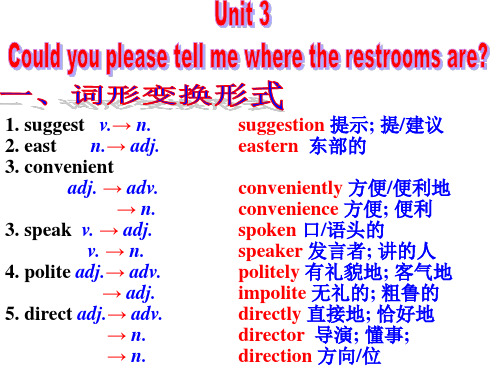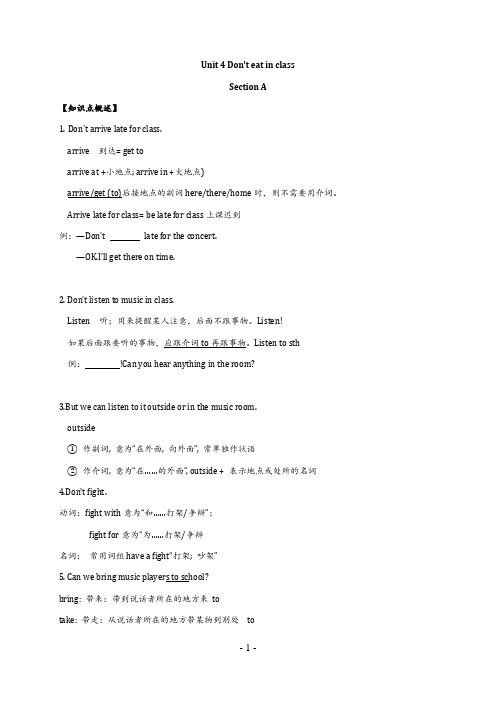6A12 Unit3 part 4讲义汇总
第6讲八年级上Units3-4

16.take...seriously 认真对待
1.Is Tom smarter than Sam?汤姆比萨姆更聪明吗? 2.Both Sam and Tom can play the drums,but Sam plays them better than Tom.萨姆和汤姆都会敲鼓,但是萨姆比汤姆敲得好。 3.Are you as friendly as your sister?你和你姐姐一样友好吗? 4.—Who is more hardworking at school?在学校谁更努力? —Tina thinks she works harder than me.蒂娜认为她比我学习更努力。 5.It has the biggest screens.它有最大的屏幕。 6.Talent shows are getting more and more popular.才艺展示越来越受 欢迎。 7.When people watch the show,they usually play a role in deciding the winner.人们看这样的节目时,通常承担着评判胜者的任务。 8.Greenwood Park is the best place to go to on weekends.绿林公园是周 末最好的去处。
Most students take buses to school.大多数学生乘公交车上学。 Could you please take out the trash?你能把垃圾倒了吗? Don't take off your clothes,it's cold outside.别脱衣服,外面很冷。 【拓展精析】 take动词,意为“花费;带走;乘坐”等。 相关短语: take...to...带……去…… take out取出 take...out of...从……中取出…… take a...lesson上……课 take a walk散步
Units 3— 4, Book 6ppt

第17课时┃ 重点突破 《恒谦教育教学资源库》
教师备课、备考伴侣 专注中国基础教育资源建设
• 典型例题 • —Do you know ________ this dictionary belongs to? • —Let me see.Oh, it's ________. • A.who does; mine B.who; me • C.whose; mine D.who; mine
11
第17课时┃ 重点突破 《恒谦教育教学资源库》
教师备课、备考伴侣 专注中国基础教育资源建设
• 3 belong to属于 • [点拨] belong to意为“属于,是……的成 员”,其中to是介词,后接名词或人称代词的 宾格形式。不能用于进行时态和被动语态。如: • All the things here belong to the school. • 这里所有的东西都属于学校。 • [拓展] belong to和名词所有格或物主代词 可以进行同义转换。如: • This fruit garden belongs to Mr.Black. • = This fruit garden is Mr.Black's. 12
6
第17课时┃ 基础过关 《恒谦教育教学资源库》
教师备课、备考伴侣 专注中国基础教育资源建设
8除非每个碟子里有专用的勺子,否则人们不能随便吃东西 .People will not help themselves to food unless each dish has its own special spoon.
15
第17课时┃ 重点突破 《恒谦教育教学资源库》
教师备课、备考伴侣 专注中国基础教育资源建设
• 典型例题 • Li Ming found a few new words ________ the article. • A.in the end B.in the end of • C.at the end of D.by the end of • [答案] C
Unit3SectionA(学生版)七年级英语上册讲义(人教版)

Unit 3 Section A目标导航单词box n.箱;盒dictionary n.词典;字典excuse v.原谅;宽恕teacher n.老师;教师yours pron.你的;你们的thank v.感谢;谢谢for prep.为了;给;对help v.&n.帮助;援助短语pencil box 铅笔盒;文具盒thank you for...为······而感谢你excuse me 劳驾;请原谅his green pen 他的绿色钢笔用法与归纳 1.What about...?(询问消息或提出建议)······怎么样?/······好吗?2.-Is that...?那是······吗?-No,it isn't.不,它不是。
/Yes,it is.是的,它是。
3.help sb(to)do sth帮助某人做某事help sb with sth在某方面帮助某人句子 1.-Is that your schoolbag?那是你的书包吗?-No,it isn't.不,它不是。
2.-Are these your books?这些是你的书吗?-No,they aren't.不,它们不是。
3.What about this dictionary?这本字典呢?4.You're wele.不客气。
知识精讲知识点01 含be动词的一般疑问句的用法教材原句Is that your schoolbag? 那是你的书包吗?(P13)用法含有be动词的一般疑问句,其构成形式是将be动词放在主语之前,且be的首字母要大写,句尾用问号。
肯定回答用“Yes,主语+be.”,否定回答用“No,主语+be not”-Is this your eraser? 这是你的橡皮吗?-Yes,it is.是的,它是。
仁爱版英语八年级上册Unit3-4复习课课件

practice the violin
be angry with sb
agree with sb
27. 在……中受欢迎 28. 没什么严重的 29. 度过一个精彩的晚会
be popular with
+sb.
nothing serious
30. 付钱 31. 感到太累 32. 停止做某事
spend a wonderful evening
were
taking
were rowing was fishing
doing
Was was
What were Bob and Jane doing? They ____________(listen) to music. Was Su Tong playing football? No, he _____(be). Hwee_r_e_li_s_te_n_i_n_g__(run). They were having a good time.
lend & borrow
1. lend 借给别人, 强调往外借, 和to连用, lend sth to sb = lend sb sth;
2. borrow借给自己, 强调往里借,自己用, 和from连用, borrow sth from sb 。
I __b_o_r_r_o_w__eda book _____ the library last wfreoemk.
Jack often _____ his bikleen__d_s me.
to
单元复习
语法一:used to do sth 过去常常做某事 语法二: 感叹句 语法三:过去进行时
功能项目一:谈论兴趣与爱好。 功能项目二:表达喜欢和不喜欢。 功能项目三:表达同意与不同意。
九年级英语总复习:八年级上册3—4单元;八年级下册5—6单元湘教版知识精讲

九年级英语总复习:八年级上册3—4单元;八年级下册5—6单元湘教版【本讲教育信息】一. 教学内容:总复习:八年级上册3—4单元;八年级下册5—6单元【模拟试题】(答题时间:80分钟)八年级英语(上)Unit 3重点考点自测题I. 单项选择。
(40分)1. ______ stamps must be great fun.A. CollectB. CollectingC. To collectingD. Collects2. I ______ listen to rock music but now I collect telephone cards and paintings.A. use toB. be sued toC. used toD. am use to3. What do you often do ______ your spare time?A. onB. inC. forD. to4. ______ go out and do some outdoor activities?A. Why notB. Why don’t yourC. Why don’tD. Why not your5. I wasn’t ______ sports at all.A. interest inB. interesting inC. interested inD. interests in6. I enjoy ______.A. danceB. to danceC. dancingD. danced7. She taught ______ English.A. himselfB. herselfC. sheselfD. oneself8. Different people have ______.A. different hobbiesB. different hobbyC. difference hobbyD. difference hobbies9. He doesn’t know ______they’re right ______.A. weather, or notB. whether; orC. whether, or notD. if; not10. Guo Lanying is ______her folk songs.A. famousB. famous withC. famous toD. famous forII. 单词填空。
人教版九年级 Units 3-4 基础知识点 课件-2021年九年级英语中考复习

① 中国位于亚洲的东部。
China is in the east of Asia. ② 墨西哥在美国以南。
Mexico is to the south of the U. S. A. ③ 中国东临太平洋
China faces the Pacific on the east. 4、 方位词有时用作副词,其前不用介词,但有时
We are always prepared to answer questions in class.
★ pay attention to “对……注意, 留心” to是介词, 后面可以接名词、代词或动词-ing形式。 ① 我努力让我的妈妈更加关注我。
I have tried to make my mother pay more attention to me. ② 你应该注意拼写这个单词。
→ adv. personally 就个人而言
★ 由used构成的短语: 1、used to do 的用法: “过去常常做某事” 2、be used to doing “习惯做某事” 3、be used to do sth “被用来做某事” 4、be used for doing sth. “被用来做某事” ① 她曾经是一个老师。(现在不是了)
She used to be a teacher. ② 我习惯早起。
I am used to getting up early. ③ 现在计算机被用来做许多事情.
Computers are used to do many things now. ④ 他过去常常骑自行车上学,但现在习惯走路上学。
He used to ride to school, but now he is used to walking
人教版英语七年级下册 Unit 4 ---6重难点复习

Unit 4 Don't eat in classSection A【知识点概述】1.Don’t arrive late for class.arrive 到达= get toarrive at +小地点; arrive in +大地点)arrive/get (to)后接地点的副词here/there/home时,则不需要用介词。
Arrive late for class= be late for class上课迟到例:—Don’t late for the concert.—OK.I’ll get there on time.2. Don’t listen to music in class.Listen 听;用来提醒某人注意,后面不跟事物。
Listen!如果后面跟要听的事物,应跟介词to再跟事物。
Listen to sth例:!Can you hear anything in the room?3.But we can listen to it outside or in the music room.outside① 作副词, 意为“在外面, 向外面”, 常单独作状语② 作介词, 意为“在……的外面”, outside + 表示地点或处所的名词4.Don't fight.动词:fight with意为“和……打架/争辩”;fight for意为“为……打架/争辩名词:常用词组have a fight“打架; 吵架”5. Can we bring music players to school?bring: 带来:带到说话者所在的地方来totake: 带走:从说话者所在的地方带某物到别处to6. can / must /have to+动词原形can许可,可以,否can’t表,不可以。
must主观,必须,否mustn’t,不准,禁止have to客观,必须,一般可与must互换,三单has to,一般现在时的否定为don’t / doesn’t have to,“不必”。
人教版新课标必修 3 Unit 4全单元 精讲讲义(附练习答案)

人教版新课标必修 3 Unit 4全单元精讲讲义Unit 4 Astronomy: the science of the starsⅠ. 要点导读重点单词1. This encouraged the development of early shellfish and all sorts of fish. (P26)development n. “发展;发达;出现;显影;开发”;其相应的动词是develop,常用搭配develop … into…,“把……发展成为……”;其形容词形式有developed (发达的;高度发展的)和developing (发展中的)eg: China is a developing country while America is a developed one.developed countries 发达国家developing countries 发展中国家2. Small clever animals, now with hands and feet, appeared and spread all over the earth. (P26)spread vt &vi. “展开;伸展;传播”,其过去式和过去分词都是spread,可用于表示具体的事物、消息、疾病等的传播;spread to“蔓延;传开”;spread over “蔓延;拖延”;spread out “铺开;展开”。
eg: In 20 years the city has spread quickly to the north.3. He was very disappointed. (P28)disappointed adj. “失望的;失意的;受挫的”,可在句中作表语、定语或宾补。
be disappointed at / about“对……感到失望”;be disappointed with“因为……而失望”。
- 1、下载文档前请自行甄别文档内容的完整性,平台不提供额外的编辑、内容补充、找答案等附加服务。
- 2、"仅部分预览"的文档,不可在线预览部分如存在完整性等问题,可反馈申请退款(可完整预览的文档不适用该条件!)。
- 3、如文档侵犯您的权益,请联系客服反馈,我们会尽快为您处理(人工客服工作时间:9:00-18:30)。
6. I often have abarbecuewith my brother.
A.烧烤B.野餐C.钓鱼D.购物
7. Look, the students are flyingkites.
A.飞机B.玩具C.风筝D.篮球
8. I like to makesandcastleson the beach.
—______4_____
改写句子
1. We are going to get thereby school bus.(对划线部分提问)
_________are we going to get there?
2. They are going to visit People’s Square.(改成否定句)
2.a good idea一个好主意
3.which place哪一个地方
4.plan a trip计划一次旅行
5.How about… ……怎么样?(常用于表示建议或提议)
6.be going to + v-原打算做…
四、Intensive Lecture
一)Important words
1.plan:(v, n)计划
词组:make a plan制定计划plan to do sth计划做某事
2. shall情态动词将要;…….好吗?
助动词shall常用于征询对方的意见,往往用于第一人称。
3. cost v.花费
用法:Sth. cost sb. some money.
回忆:spend, take, pay的用法
4. trip n.旅行
—Where are we going to visit ?
—_______1______
—How are we going to get there?
—______2_____
—What time are we going to get there?
—______3_____
—What time are we going to come back?
A./B. atC. to D. in
8 The boy likes to play____ football but the girl likes to play _____ piano.
A. the, /B. /, the C. a, theD. the , a
9 I don't have ____ to buy this new flat.
1. be going to表示近期、眼下就要发生的事情,will表示的将来时间则较远一些。
如:He is going to write a letter tonight.
2. be going to表示根据主观判断将来肯定发生的事情,will表示客观上将来势必发生的事情。
He is seriously ill. He is going to die.
A. is wash B. washing C. washes D. wash
14. ---_______ is he going to get to Dragon Bay Station?
--- He is going there by taxi.
A. where B. What C. How D. When
_____ _____ does this book cost?
六、Homework
Can animals be made to work for us ? Some scientists think that one day animals may be t____ to do a number of simple jobs .They s____ that in a film or on TV we may see elephants , monkeys ,dogs ,bears ,or other animals doing a lot of things .If you w_____ carefully , you may find that those animals are given something to eat in return for d____ them . The scientists say that many d_____ animals may be taught to do a number of simple jobs if they will get something to eat .
一、Lead-in
Stop comparing yourself to other people
停止拿自己与他人比较。
二、Words Review
1. We will go to theseasidethis Sunday.
A.海边B.海岸C.海洋D.角落
2. The little boy is verylucky.
东方教育学科教师辅导讲义
讲义编号SH12sx00021
授课班级:年级:小六课时数:
学员姓名:辅导科目:英语学科教师:
学科组长签名及日期
剩余课时数
课题
6A Unit3 ( Part4 )
授课时间:
备课时间:
教学目标
1、课文讲解
2、语法讲解
重点、难点
正确运用wh-开头的疑问句
考点及考试要求
wh-疑问句
教学内容
五、Practice
Ⅰ.单项选择
1. Look at the map__________ Shanghai.
A. of.B. inC. withD. at
2. This is a photograph of my family and _________.
A. IB. me C. mine D. my
同义词:journey
搭配:go on a trip (to)…../ make a trip (to)(去)…….旅行
5. a.m.上午
6. o’clock adv. ……点钟(表示整点)
二)Important Sentences
1Which place ……?哪里,询问地点
2When……?询问时间,表示“何时”
3. Canada is_______ China.
A. awayB. far away C. far D. far away from
4. It’s going ___________ a nice day.
A. to beB. toC beD. is
5. — When are we going to have a picnic?
A. enough moneyB. money enough
C. enough moneysD. moneys enough
10 We promise ____ less rubbish.
A. makingB. to make C. makeD. makes
11. They are going to take a bus _________ Moon Park.
— _______ about next Friday?
A. WhereB. WhichC. When D. How
6. Let’s go to the zoo _______foot.
A. byB. withC. on D. use
7. How are we going to get _____ there?
He will be twenty years old.
3. be going to含有“计划,准备”的意思,而will则没有这个意思。
如:She is going to lend us her book.
注:在有条件从句的主句中,一般不用be going to,而多用will。
如:If he comes back, I'll tell her that.
5. He ____________ (be) never late for school.
III.完成对话
A.How about 2 o'clock?
B.We are going to come back at 5 o'clock.
C.Let's go to the Century Park.
D.We are going to get there by bus.
同意对方的建议,回答时常用:Good idea!好主意!/Great!太好了!/Cool!太棒了/Certainly!当然可以!/OK.好的。/Of course.当然可以。/Yes ,please.是的。/Yes ,I think so.对,我也是这样想的。/All right.好的。/I agree with you.我同意你的看法。/I’d love to.我愿意。
3What time……?对具体的时刻提问。
4---How are we going to get there?对交通方式进行提问。
--- Let’s go by bus.回答用by+交通工具
be going to do用于将来时,表示对将来的打算。否定式为be not going to do
by bus = take a bus(take接交通工具时,交通工具前需加冠词)
A.沙子B.城堡C.沙堡D.沙滩
9. My aunt likes tocollectstamps.
A.收集B.保护C.观看D.欣赏
10. There are many photos in thisalbum.
A.小册子B.书本C.照相机D.相册
三、New Phrases
1.plan to do sth.计划做某事
